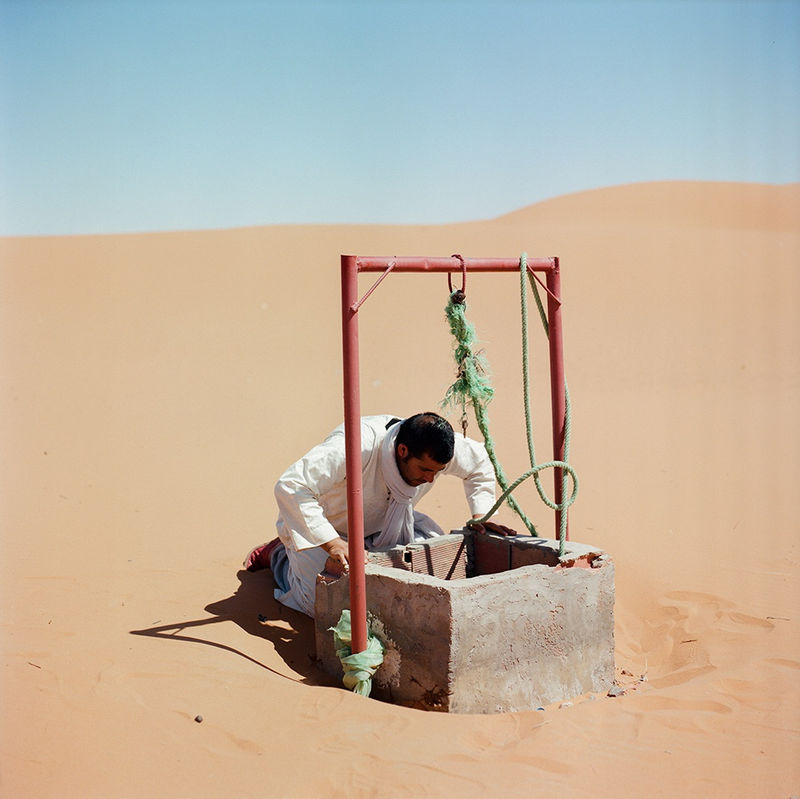M'hammed Kilito: Before It's Gone
The series Before It's Gone by the Moroccan photographer M'hammed Kilito was awarded the Grand Prize at last year's edition of Kranj Foto Fest 2022. Since Galerija Fotografija is a partner of the festival for the second year, we decided to exhibit an excellent series of photographs in the gallery space at the start of the activities for this year's edition of the festival. At the same time, recently Kilito also became the regional winner of the prestigious World Press Photo and this is one reason more in favor of our decision.
The mature and coherent body of work that translates into a long-term commitment to a relevant issue in his own country brings into the spotlight the degradation of oases in Morocco - the growing issue is responsible for the displacement of many people, including the younger generations, who are forced to leave due to water crises, lack of job opportunities, and general isolation. With his visual narrative of landscapes, portraits, and objects, M'hammed invites us all to enter the world of those who have long been suffering the impacts of destructive human activities and climate change.
"Over the past few years, I have visited many oases, where I have made strong connections with the people there. I was able to understand this rich environment, but also its glaring realities. I realized that desertification, recurrent droughts and fires, changes in agricultural practices, overexploitation of natural resources, rural exodus, and the sharp drop in the water table all pose imminent threats to the existence of these vital oases. Located in arid and semi-arid regions and considered an ecological bulwark against desertification and an important refuge for biodiversity, oases constitute an original ecosystem, based on the right balance of three elements: the abundance of water, the quality of the soil and the presence of date palms. The date palms with their parasol-shaped foliage create a real humid microclimate, shaded from the wind and favourable to the development of plants. For the past twenty years, this balance no longer exists and these islands of greenery in the middle of the desert are suffering the impacts of destructive human activities and climate change. I decided to work on this project to highlight these multiple concerns rarely covered by the media and largely unknown to the general public and to protect the ancestral intangible heritage of the nomadic culture in Morocco along with oasis ecosystems." - M'hammed Kilito
M'hammed Kilito (b. 1981, Lviv) is a Casablanca-based documentary photographer, a National Geographic Explorer, and is currently participating in a two-year VII Mentor Program. In his photography practice, he investigates the relationships between humans and the environment in which they live, and is particularly interested in capturing narratives that facilitate an understanding of this relationship in connection to cultural identity, the sociology of work, and climate change. Together with three other Moroccan visual artists, Kilito co-founded KOZ, a collective dedicated to telling compelling stories through long-term projects. The photographer's work has been showcased in various festivals and exhibitions, including Sharjah Art Foundation (UAE), San Jose Foto (Uruguay),1:54 Art Fair (France), Tate Modern (UK), Format Festival (UK), Photo Vogue Festival (Italy), and Leica Ernst Leitz Museum (Germany), and published in magazines and newspapers, such as The Washington Post, The Wall Street Journal, The British Journal of Photography, Vogue Italia, L'Express, and Liberation. Kilito has received numerous awards and grants, including the World Press Photo Regional Prize 2022, the Contemporary Artist Prize by François Schneider Foundation, the National Geographic Society Explorer Grant and the Grand Prize of Kranj Photo Festival, while also being shortlisted for the Leica Oskar Barnack Award.







